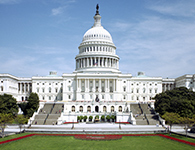 NACWA spearheaded a letter
NACWA spearheaded a letter  sent to House leadership July 6th urging consideration of H.R. 5303, the Water Resources Development Act (WRDA) of 2016, as quickly as possible. The letter was sent to Speaker Paul Ryan (R-WI) and Majority Leader Kevin McCarthy (R-CA), who will determine whether the bill receives floor time this year. NACWA was joined on the letter by 15 other organizations representing the local government, water, and infrastructure sectors, demonstrating the broad base of support for moving the bill.
sent to House leadership July 6th urging consideration of H.R. 5303, the Water Resources Development Act (WRDA) of 2016, as quickly as possible. The letter was sent to Speaker Paul Ryan (R-WI) and Majority Leader Kevin McCarthy (R-CA), who will determine whether the bill receives floor time this year. NACWA was joined on the letter by 15 other organizations representing the local government, water, and infrastructure sectors, demonstrating the broad base of support for moving the bill.
The House WRDA package  (HR 5303) deals narrowly with flood control projects authorized for the Army Corps of Engineers (ACOE), whereas the Senate WRDA package includes significant clean water and safe drinking water provisions. NACWA has been advocating strongly for the Senate package and anticipates the Senate will move before the House. However, the House will also need to pass a version of the bill before WRDA can go to conference, where NACWA will advocate for inclusion of key clean water sector provisions.
(HR 5303) deals narrowly with flood control projects authorized for the Army Corps of Engineers (ACOE), whereas the Senate WRDA package includes significant clean water and safe drinking water provisions. NACWA has been advocating strongly for the Senate package and anticipates the Senate will move before the House. However, the House will also need to pass a version of the bill before WRDA can go to conference, where NACWA will advocate for inclusion of key clean water sector provisions.
NACWA has been working hard to encourage passage of the Senate WRDA bill before Congress leaves for its Summer Recess on July 15. However, it is appearing increasingly unlikely the Senate will hold votes on WRDA before recess as the remaining floor time is being taken up by other matters. NACWA is already planning additional outreach over the remainder of the Summer to encourage both the Senate and House to take up WRDA when Congress returns to Washington in September. For more information, contact Kristina Surfus, NACWA’s Legislative Affairs Manager.
Association Comments on EPA Environmental Justice Plan, Calls for Greater Focus on Affordability Concerns
 NACWA submitted comments last week on EPA’s draft EJ 2020 Action Agenda, supporting key elements of the Agency’s new environmental justice (EJ) strategic plan but also calling for greater emphasis on community affordability concerns and more proactive actions by EPA to help clean water utilities avoid potential enforcement related to EJ issues.
NACWA submitted comments last week on EPA’s draft EJ 2020 Action Agenda, supporting key elements of the Agency’s new environmental justice (EJ) strategic plan but also calling for greater emphasis on community affordability concerns and more proactive actions by EPA to help clean water utilities avoid potential enforcement related to EJ issues.
The Association’s comments support EPA’s recognition of the need to increase partnership at all level of government to advance EJ initiatives, especially the need to work collaborative with local governments and co-regulators. Municipal clean water utilities have long been critical partners and co-regulators within the Clean Water Act context – particularly around industrial pretreatment and municipal stormwater issues – and it is gratifying to see an acknowledgement of this co-regulator role in the context of EJ concerns.
At the same time, NACWA’s comments call on EPA to provide a broader definition of EJ that includes a greater focus on community affordability concerns. As NACWA has previously made clear to EPA, the low-income communities most targeted for EJ initiatives in the clean water sphere are also the same ones that are least able to afford the significant rate increases – and bear a disproportioned percentage of the cost – related to federal clean water mandates. The financial impact on these households must be part of EPA’s overall EJ analysis. NACWA’s comments also request EPA take a more proactive approach in providing compliance assistance to communities and utilities struggling with EJ issues before proceeding straight to an enforcement action.
NACWA’s comments were developed in conjunction with the Association’s Environmental Justice Task Force. EPA will continue to take comments on the Action Agenda until July 28th if other Association members would like to submit input to the Agency. NACWA will continue to stay engaged with EPA on EJ issues moving forward – anyone with questions about NACWA’s EJ work can contact Nathan Gardner-Andrews.
Feedback Requested on Revised CWA 404 Nationwide Permit & Potential TMDL, CSO Program Implications
 The Army Corps of Engineers (Corps) has proposed a revised draft Nationwide Permit 27
The Army Corps of Engineers (Corps) has proposed a revised draft Nationwide Permit 27  (NWP 27) for public comment. NACWA is soliciting feedback from members on whether the Association should comment (or join a collaborative comment effort with other state/county groups) on the NWP 27 and/or reach out to EPA, the Corps, and the Office of Management and Budget.
(NWP 27) for public comment. NACWA is soliciting feedback from members on whether the Association should comment (or join a collaborative comment effort with other state/county groups) on the NWP 27 and/or reach out to EPA, the Corps, and the Office of Management and Budget.
NWP 27 is the primary national 404 permit dealing with work in streambeds. This is relevant for clean water utilities if their existing combined sewer overflow (CSO) or total maximum daily load (TMDL) programs require restoration of streams. This memo  contains more background on the 404 program and why NWP 27 is significant to clean water utilities.
contains more background on the 404 program and why NWP 27 is significant to clean water utilities.
NACWA is exploring whether the Association should seek additional changes to NWP 27 to simply the 404 permitting process for clean water utilities pursuing streambed restoration. Member responses to the following questions are critical to helping make this determination:
- States without TMDL Regional General Permits (RGP) often have few tools to help expedite the permitting of streambed restoration projects, and NACWA has heard from a number of members that 404 coordination is a constant struggle. In the absence of region-specific TMDL RGPs, could NWP 27 be improved and provide a mechanism to better facilitate the permitting of many of these projects nationally? How? Could there be a better tool to allow for consistency and larger projects? If so, what?
- For states/regions that do have RGPs, please provide details on how those RGPs work and what changes to NWP 27 would be most beneficial.
Any feedback should be sent to Brenna Mannion by July 15. The deadline for comment on the draft NWP is August 1.